PEP人教版六年级下册英语重点单词及句子
【口袋书】人教版PEP六年级下册英语 基础知识汇总
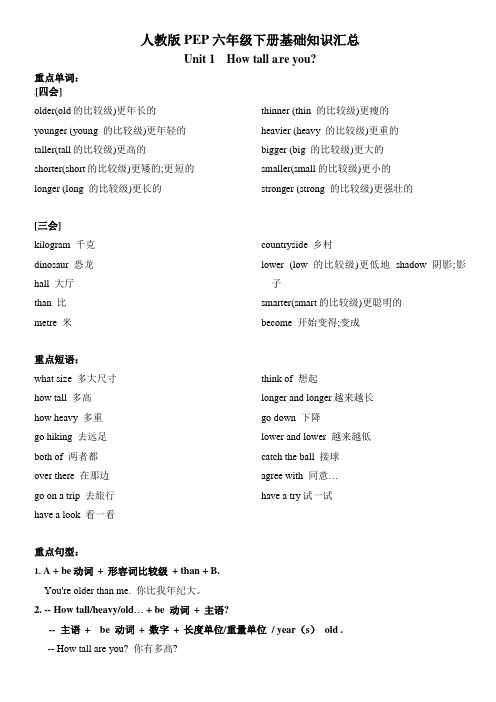
人教版PEP六年级下册基础知识汇总Unit 1 How tall are you?重点单词:[四会]older(old的比较级)更年长的younger (young 的比较级)更年轻的taller(tall的比较级)更高的shorter(short的比较级)更矮的;更短的longer (long 的比较级)更长的thinner (thin 的比较级)更瘦的heavier (heavy 的比较级)更重的bigger (big 的比较级)更大的smaller(small的比较级)更小的stronger (strong 的比较级)更强壮的[三会]kilogram 千克dinosaur 恐龙hall 大厅than 比metre 米countryside 乡村lower (low 的比较级)更低地shadow 阴影;影子smarter(smart的比较级)更聪明的become 开始变得;变成重点短语:what size 多大尺寸how tall 多高how heavy 多重go hiking 去远足both of 两者都over there 在那边go on a trip 去旅行have a look 看一看think of 想起longer and longer越来越长go down 下降lower and lower 越来越低catch the ball 接球agree with 同意…have a try试一试重点句型:1.A + be动词+ 形容词比较级+ than + B.You're older than me. 你比我年纪大。
2. -- How tall/heavy/old… + be 动词+ 主语?-- 主语+ be 动词+ 数字+ 长度单位/重量单位/ year(s)old .-- How tall are you? 你有多高?-- I'm 1. 65 metres. 我身高1. 65米。
新人教版小学英语六年级下册各单元重点考点总结
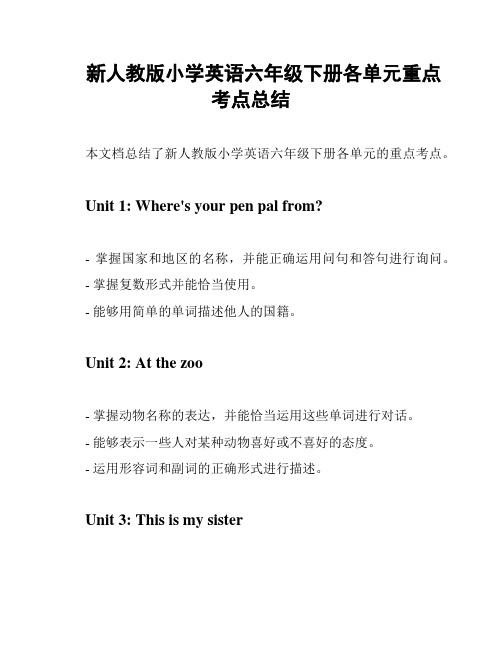
新人教版小学英语六年级下册各单元重点考点总结本文档总结了新人教版小学英语六年级下册各单元的重点考点。
Unit 1: Where's your pen pal from?- 掌握国家和地区的名称,并能正确运用问句和答句进行询问。
- 掌握复数形式并能恰当使用。
- 能够用简单的单词描述他人的国籍。
Unit 2: At the zoo- 掌握动物名称的表达,并能恰当运用这些单词进行对话。
- 能够表示一些人对某种动物喜好或不喜好的态度。
- 运用形容词和副词的正确形式进行描述。
Unit 3: This is my sister- 掌握表示家庭成员关系的词汇,并能在合适的情境下熟练使用。
- 能够用简单的句子表达自己和他人的家庭成员状况。
- 掌握疑问句和肯定/否定回答的语法结构。
Unit 4:What do you usually do on weekend?- 掌握表示日常活动和娱乐爱好的名词和动词,并能在合适的情境下熟练使用。
- 能够描述周末的计划,并能够用适当的时态表达过去、现在和未来的时间。
- 学会以礼貌的方式询问和回答他人的问题。
Unit 5: What's the matter?- 能够描述自己的身体不适,并能运用一些常用的疾病词汇。
- 掌握表示询问、建议和回答的用语,并能在合适的情境下使用。
- 学会表示关心和病愈等祝福的表达方式。
Unit 6: It's raining- 学会用简单的句子描述天气情况,并能表达对不同天气的态度。
- 掌握天气形容词的表达方式。
- 能够描述不同季节的气温、天气和风景。
总之,在学习小学英语六年级下册的过程中,应注重关注以上重点考点,并在实际中多进行运用练习,以此提高英语水平。
Unit1Howtallareyou_默写版单词短语重点句子(知识清单)-人教PEP版英语六年级下册

六年级下册单词,重点词组和重点句子默写Unit 1重点单词1.更年轻的______________ 12. hall______________2.更年长的______________ 13. meter /metre______________3.更高的______________ 14. than______________4.更矮的______________ 15. both______________5.更长的______________ 16. kilogram______________6.更瘦的______________ 17. countryside______________7.更重的______________ 18. lower______________8.更大的______________ 19. shadow______________9.更小的______________ 20. bee______________10.更强壮的______________ 21. smarter______________11. dinosaur______________重点短语1.我们两个都______________ 8. what size______________2. over there______________ 9.那些鞋子______________3.多高______________ 10. heavier than me______________4.1.65 metres______________ 11.看一看______________5.多重______________ 12. the tallest dinosaur______________6.48 kilograms______________ 13.越来越低______________7.如此小______________ 14.越来越长______________重点句型1. 那是这个厅里最高的恐龙。
新人教pep版六年级英语下册unit1复习总结

新人教pep版六年级英语下册unit1复习总结一、单词巩固:(写出下列形容词的比较级)一、重点句子。
1.I’m taller than this dinosaur.我比这只恐龙高。
2.Some dinosaurs are bigger than houses.Some are smaller than our schoolbags.一些恐龙比房子大。
一些比我们的书包小。
3.询问体重的问句:--How heavy is it?它体重多少?--It’s five tons.它5吨。
4.询问鞋子的尺码:--What size are your shoes?你穿多大号的鞋?--What are your shoes?你穿多大号鞋?--My shoes are size35.我穿35号的鞋。
5.询问高度:--How tall is it?它有多高?--Maybe4metres.可能4米。
--I’m1.65metres.我身高1.65米。
--Size7.7号。
6.询问体重:--How heavy are you?你体重多少?--I’m48kilograms.我体重48千克。
课堂操练:按要求完成句子。
1.I am46kilograms.(对画线部分提问)1.Ⅰwear size37in China.(对画线部分提问)2.My friend is9years old.(对画线部分提问)3.Peter is shorter than Sam.(对画线部分提问)5.I am stronger than my brother.(改为一般疑问句)三、语法专项:形容词比较级的规则变化:单音节词和少数双音节词:(1)一般在词尾加“er”。
例如:tall—taller,young younger,old一older,small smaller。
(2)以字母“e”结尾的词,加“r”。
例如:fine—finer,nice-nicer,late-later。
人教版六年级英语下册各单元必背词汇和句型
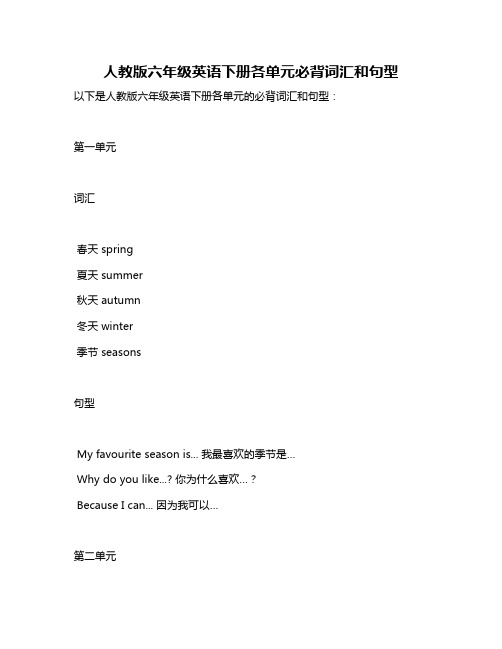
人教版六年级英语下册各单元必背词汇和句型以下是人教版六年级英语下册各单元的必背词汇和句型:第一单元词汇春天 spring夏天 summer秋天 autumn冬天 winter季节 seasons句型My favourite season is... 我最喜欢的季节是…Why do you like...? 你为什么喜欢…?Because I can... 因为我可以…第二单元词汇游泳 swim滑冰 skate放风筝 fly a kite堆雪人 make a snowman季节活动 seasonal activities句型What do you do in the...? 你在…做什么?I usually... 我通常…Do you often...? 你经常…吗?Yes, I do. / No, I don’t. 是的,我经常。
/ 不,我不经常。
第三单元词汇星期一 Monday星期二 Tuesday星期三 Wednesday星期四 Thursday星期五 Friday星期六 Saturday星期日 Sunday星期 weekdays星期天 weekends句型What do you have on...? 你星期几有什么课?I have... 我星期几有…课。
When do you have...? 你什么时候有…课? I have... on... 我在星期几有…课。
第四单元词汇电影 movies公园 parks图书馆 libraries博物馆 museums商店 shops饭店 restaurants医院 hospitals学校 schools银行 banks邮局 post offices公共场所 public places 句型。
人教版六年级pep三年级起点英语单词及重点句子

Unit 1 How do you go to school?一、重点短语:by plane 坐飞机 by ship 坐轮船 on foot步行 by bike 骑自行车by bus 坐公共汽车 by train 坐火车 trafficlights 交通灯 traffic rules交通规则go to school 去上学 get to 到达 get on上车 get off下车Stop at a red light. 红灯停 Wait at a yellow light. 黄灯等Go at a green light. 绿灯行二、重点句型:1.How do you go to school?你怎么去上学?ually I go to school on foot.Sometimes I go by bus.通常我步行去上学。
有时候骑自行车去。
3.How can I get to Zhongshan Park ?我怎么到达中山公园?4.You can go by the No. 15 bus. 你可以坐15路公共汽车去。
三、重点语法:1、There are many ways to go somewhere.到一个地方去有许多方法。
这里的ways一定要用复数。
因为there are是There be句型的复数形式。
2、on foot 步行。
乘坐其他交通工具大都可以用介词by…,但是步行只能用介词on 。
3、go to school的前面绝对不能加the,这里是固定搭配。
4、USA 和US 都是美国的意思。
另外America也是美国的意思。
5、go to the park 前面一定要加the. 如果要去的地方有具体的名字,就不能再加the ,如果要去的地方没有具体名字,都要在前面加the. (go to school除外。
)6、How do you go to…?你怎样到达某个地方?如果要问的是第三人称单数,则要用:How does he/she…go to …?7、反义词:get on(上车)—get off(下车) near(近的)—far(远的) fast(快的)—slow(慢的)because(因为)—why(为什么) same(相同的)—different(不同的)8、近义词:see you—goodby esure—certainly—of course9、频度副词:always 总是,一直 usually 通常 often经常 sometimes 有时候 never 从来不Unit 2 Where is the science museum?一、重点短语:library 图书馆 post office 邮局 hospital医院 cinema 电影院bookstore书店 science museum科学博物馆 turnleft向左转turn right 向右转 go straight 直行 north北 south南east东west西next to靠近、与……。
PEP人教版六年级下册英语重点知识总结 unit2

Unit 2 What’s the matter, Mike?一、单词与短语1.have a fever 发烧2.have a sore throat喉咙疼3.have a cold感冒4.have a toothache 牙疼5. have a headache 头疼6.matter事情,麻烦7.sore 疼的8.hurt疼痛9.nose 鼻子10.tired疲劳的,累的11.excited兴奋的12.angry生气的13.happy高兴的14.bored无聊的,烦人的15.sad 忧伤的,悲伤的16.sick 不舒服17. take some medicine 吃点药18.have the flu患流感二、句型1. What’s the matter? 你怎么啦?2. How do you feel? 你感觉如何?How dose Amy feel? Amy感觉如何?3. My leg hurts. 我腿疼。
I have a toothache. 我牙疼。
4. Do you have a sore throat? 你喉咙疼吗?5. Don’t worry! 别担心!6. You will feel better soon! 你很快会好起来的!7. You look happy. 你看起来很开心。
8. I feel very sad. 我感觉很伤心。
三、对话Doctor: How do you feel? 你感觉如何?Amy: I feel sick. 我不舒服。
Doctor: What’s the matter? 你怎么啦?Amy: I have a fever. 我发烧了。
Doctor: let me see. 让我看看。
Do you have a sore throat? 你喉咙疼吗?Amy: Yes. My throat is sore. 是的。
我的喉咙很疼。
Doctor: Don’t worry! Take some medicine. You will feel better soon! 别担心,吃点药就好了!Amy: Thank you very much!非常感谢!Doctor: You are welcome! 不客气!练习题一、翻译下列短语(10分)感冒发高烧头痛have a sore throat牙痛二、选词填空(20分)1 、What’s the (matter, wrong) with you?2、I (have, feel ) a fever.3、My throat is (sore, ill).4、What’s wrong (for, with) you?5、You’d better go to (see, look) a doctor.三、选答句(20分)1. Does Lisa feel angry? ( )2. Do Chen Jie go swimming with her parents? ( ) 3. What is the matter with you, John? ( )4. How do you go to Beijing? ( )5. What do you do when you hurt your leg? ( )四、补全对话。
人教版PEP六年级英语下册小升初重点单词及短语复习资料

Unit1g e t up起床have breakfast吃早餐go t o school去上学School begins.开始上课have lunch吃午饭School is over放学go home回家have dinner吃晚饭watch TV看电视go t o bed睡觉breakfast早餐lunch午餐dinner晚餐cook breakfast做早餐teach English教英语take a walk散步read stories读故事walk走;步行every每一个morning早晨六年级上册单词表afternoon下午evening晚上;傍晚see a film看电影play the piano弹钢琴clean the window擦窗户clean the door擦门clean the floor擦地板often时常easy容易difficult困难Unit2collect toy cars搜集玩具汽车collect stamps搜集邮票collect maps搜集地图collect picture cards搜集图片open开;打开hobby爱好map地图box盒子colour颜色go fishing去钓鱼plant flowers种花cook meals做饭dad爸爸mum妈妈plant植物;种植flower花drink喝tea茶play computer games玩电脑游戏mak e dolls tak e pho t os照相photo照片kid小孩baby婴儿hungry饿的cry哭Unit3invite your friends t o your party 邀请朋友参加聚会celebrate your birthday with your friends与朋友庆祝生日time时间after在......后then那时me我(I的宾格)bye再见star-shaped cake星形蛋糕jelly果冻fruit pie水果派;水果馅饼kind种类chocolate巧克力ice cream冰激凌candy糖果sure当然light the candles点蜡烛sing the birthday so ng唱生日歌mak e a wish许愿blow out the candles吹蜡烛cut the cake切蛋糕eat the cake吃蛋糕here在这里for给;为了light点燃Unit4the first month of the year 一年里的第一个月the second month of the year 一年里的第二个月New Y ear's Day元旦Spring Festival春节January一月February二月back回原处;后面their他(她,它)们的the third month of the year 一年里的第三个月the fourth month of the year 一年里的第四个月T ree Planting Day植树节Easter复活节March三月April四月tree树;树木grass草;草地st op(使)停egg蛋;卵the fifth month of the year一年里的第五个月the sixth month of the year一年里的第六个月Labour Day劳动节May五月June六月M other’s Day母亲节Children’s Day儿童节Father’s Day父亲节hear d-shaped cake心形蛋糕give a birthday card t o your friend向朋友赠送生日礼Unit5the seventh month of the year一年里的第七个月the eighth month of the year一年里的第八个月the Party’s birthday党的生日Army Day建军节July七月August八月month月Dayyear 年the ninth month of the year 一年里的第九个月the tenth month of the year 一年里的第十个月 National Day 国庆节 September 九月 October 十月the eleventh month of the year 一年里的第十一个月the twelfth month of the year一年里的第十二个月Thanksgiving 感恩节 Christmas 圣诞节 November 十一月December 十二月Teacher’s 教师节Unit 6farm the land 种地;种田go on spring outgoings 去春游 fly kites 放风筝season 季节spring 春天little 一点green 绿色(的) bird 鸟 fly 飞go on a trip 去旅游go t o a summer camp 去夏令营 have summer holidays 过暑假 begin 开始 close 关;关闭 summer 夏天 weather 天气 heavy 重的 rain 雨;下雨 pick apples 摘苹果 cut rice 割稻子mak e a snowman 堆雪人 sweep the snow aut umn 秋天yellow 黄色(的)brown 棕色(的) white 白色(的) winter 冬天snowman 雪人六年级上册短语总结Unit11.be from/come from来自于20.have dinner吃晚餐2.Primary Six第六小学21.watch TV看电视3.Grade Six六年级22.for30minutes30分钟4.let sb do sth让某人做某事5.tell sb abo ut sth告诉某人关于某事6.tell sb t o do sth告诉某人做某事7.daily life日常生活8.ge t up起床9.in the morning在早上10.have breakfast吃早饭11.at six在六点钟at abo ut six在六点钟12.go t o school去学校13.School begins开始上课14.have seven subjects有七门课15.have lunch吃午餐16.at school在学校17.School is over放学18.in the afternoon在下午19.go home回家23.do some reading阅读24.go t o bed去睡觉25.How abo ut=w hat abo ut怎么样26.best wishes最好的祝愿27.be happy t o do sth高兴做某事28.get your email收到你的邮件29.in Grade Six在六年级30.an English teacher一位英语老师31.every morning每天早上32.cook breakfast做早饭33.go t o school去上学34.have four lessons a day一天有四节课35.learn English学英语36.by doing sth通过做某事37.play games玩游戏38.like sth very much非常喜欢某事39.cook dinner做晚餐40.after dinner晚饭 2.have a look看一看41.take a walk散步 3.open the box and see打开盒子看一看42.read sth t o sb读某东西给某人 4.What a super car!多棒的一辆小车啊!43.On Saturday每周六 5.collect stamps收集邮票44.see a film看电影 6.1)How abo u t you?你呢?45.have piano lessons上钢琴课46.It is adj t o do sth做某事是怎么样的47.help sb(to)do sth帮助某人做某事48.help sb with sth帮助某人某事49.practice doing sth练习做某事50.enjoy doing sth喜欢做某事51.at home在家52.do the housework做家务53.learn from sb向某人学习54.should do sth应该做某事55.teach English教英语56.read stories读故事57.clean the window擦窗户58.clean the door擦门59.clean the floor擦地板Unit21.a new toy car一辆新的小汽车2)How abo ut doing sth?做...怎么样?7.collect maps收集地图8.collect picture cards收集图片9.so colourful and beautiful如此多彩漂亮10.want t o do sth想要做某事11.look at看一看12.my family pho t o s我的全家福13.plant flowers种花14.drink Chinese tea喝中国茶15.That’s great那太棒了!16.That’s interesting那太有趣了!17.That’s wonderful那太棒了!18.look at this photo看这个照片19.in this photo在这个照片里20.at her birthday party在她的生日派对21.make a doll=mak e dolls做布娃娃22.be interested in sth对某事感兴趣d23.be interested in doing sth对做某事感兴趣much. 非常感谢5.would like t o do sth. = want t o do sth.24.play computer games 玩电脑游戏想要做某事25.take pho t o s 拍照片 6.my birthday party 我的生日聚会 26.two phot o s 两张照片 7.I ’ l ove to. 我愿意。
人教版六年级下册英语unit 1-4重点单词句子默写
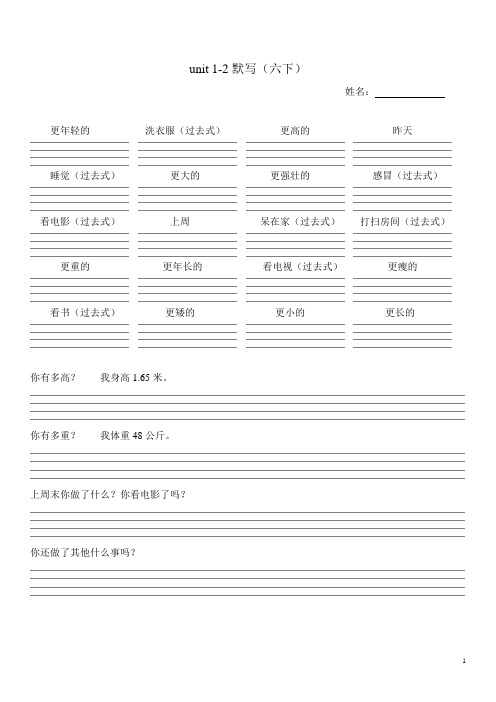
unit 1-2默写(六下)
姓名:更年轻的洗衣服(过去式)更高的昨天
睡觉(过去式)更大的更强壮的感冒(过去式)看电影(过去式)上周呆在家(过去式)打扫房间(过去式)更重的更年长的看电视(过去式)更瘦的看书(过去式)更矮的更小的更长的
你有多高?我身高1.65米。
你有多重?我体重48公斤。
上周末你做了什么?你看电影了吗?
你还做了其他什么事吗?
unit 3-4默写(六下)
姓名:
草坪去野营(过去式)体育馆滑冰
弄伤了我的脚(过去式)拍照(过去式)游泳(过去式)骑马(过去式)买礼物(过去式)去骑自行车打羽毛球骑自行车(过去式)去钓鱼(过去式)吃新鲜的食物(过去式)饭厅
怎么了?
你去哪儿了?我去了森林公园。
你们怎么去那的?我们坐飞机去的。
我以前的学校里没有图书馆。
你怎么知道的?。
新人教版(PEP)小学英语六年级下册各单元知识点总结
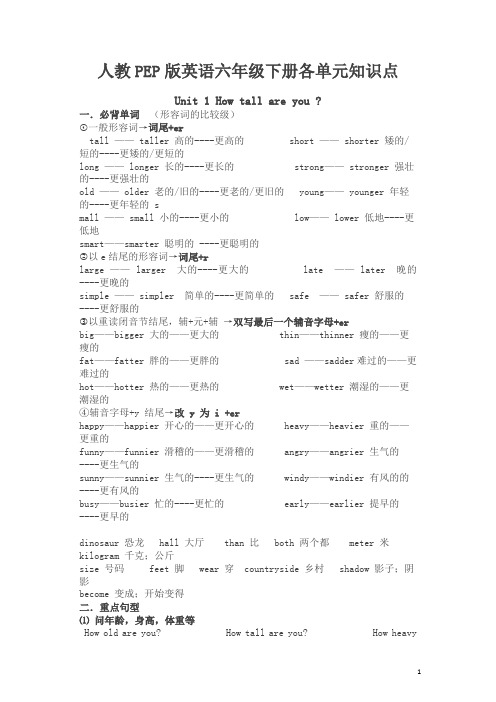
人教PEP版英语六年级下册各单元知识点Unit 1 How tall are you ?一.必背单词(形容词的比较级)①一般形容词→词尾+ertall —— taller 高的----更高的 short —— shorter 矮的/短的----更矮的/更短的long —— longer 长的----更长的 strong—— stronger 强壮的----更强壮的old —— older 老的/旧的----更老的/更旧的 young—— younger 年轻的----更年轻的 small —— small 小的----更小的 low—— lower 低地----更低地smart——smarter 聪明的 ----更聪明的②以e结尾的形容词→词尾+rlarge —— larger 大的----更大的 late —— later 晚的----更晚的simple —— simpler 简单的----更简单的 safe —— safer 舒服的----更舒服的③以重读闭音节结尾,辅+元+辅→双写最后一个辅音字母+erbig——bigger 大的——更大的 thin——thinner 瘦的——更瘦的fat——fatter 胖的——更胖的 sad ——sadder难过的——更难过的hot——hotter 热的——更热的 wet——wetter 潮湿的——更潮湿的④辅音字母+y 结尾→改 y 为 i +erhappy——happier 开心的——更开心的 heavy——heavier 重的——更重的funny——funnier 滑稽的——更滑稽的 angry——angrier 生气的----更生气的sunny——sunnier 生气的----更生气的 windy——windier 有风的的----更有风的busy——busier 忙的----更忙的 early——earlier 提早的----更早的dinosaur 恐龙 hall 大厅 than 比 both 两个都 meter 米kilogram 千克;公斤size 号码 feet 脚 wear 穿 countryside 乡村 shadow 影子;阴影become 变成;开始变得二.重点句型⑴ 问年龄,身高,体重等How old are you? How tall are you? How heavyare you?--- I’m _______ (years old). --- I’m ______metres tall. ---- I’m ______ kilograms .⑵ 问物品的情况:① How large is your room? 你的房间有多大?It’s ______ m (square meters.) 有___平方米。
PEP人教版小学英语六年级下册Unit 2单元知识梳理总结
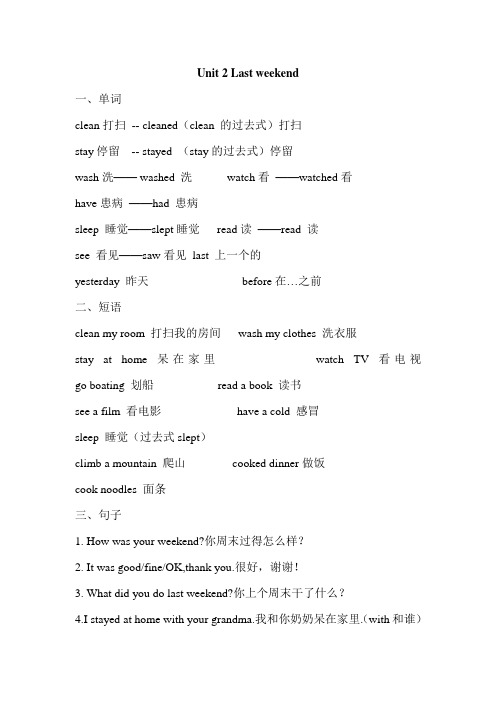
Unit 2 Last weekend一、单词clean打扫-- cleaned(clean 的过去式)打扫stay停留-- stayed (stay的过去式)停留wash洗—— washed 洗watch看——watched看have患病——had 患病sleep 睡觉——slept睡觉read读——read 读see 看见——saw看见last 上一个的yesterday 昨天before在…之前二、短语clean my room 打扫我的房间wash my clothes 洗衣服stay at home 呆在家里watch TV 看电视go boating 划船read a book 读书see a film 看电影have a cold 感冒sleep 睡觉(过去式slept)climb a mountain 爬山cooked dinner做饭cook noodles 面条三、句子1. How was your weekend?你周末过得怎么样?2. It was good/fine/OK,thank you.很好,谢谢!3. What did you do last weekend?你上个周末干了什么?4.I stayed at home with your grandma.我和你奶奶呆在家里.(with和谁)5. Did you do anything else?你还做了其他什么事吗?6. Yes,I cleaned my room and washed my clothes.是的,我扫了房间,还洗了衣服。
7.I want to buy the new film magazine.我想买期新的电影杂志。
8.Did you see a film?你看电影了吗?No,I didn’t .I had a cold. I stayed at home all weekend and slept.没有,我感冒了。
人教版PEP版英语六年级下册第一单元重点知识集锦

PEP六年级下册单元重点知识集锦Unit1一.单词(教材54页Unit1,共计22个)二.短语1.how heavy多重2.what size什么尺码3.how tall多高4.both of us我们两个5.more dinosaurs更多的恐龙6.how old多大7.go shopping去购物8.go hiking去远足9.have a look at看一看10.think of想起11.any other任何其他的12.go on a trip to去旅行13.go down下沉、下降14.get lower and lower变得越来越低15.my shadow我的影子16.agree with同意17.talk about谈论18.have a try试一试19.an excellent goal keeper一个优秀的足球守门员20.need teamwork需要团结三.知识点1.how的用法(1)问身体健康等情况。
How are your parents?你父母身体好吗?How are things in your father’s factory?你爸爸厂里的情况怎么样?(2).问天气状况。
How is the weather today?今天天气怎么样?(3)询问方式。
How does your mother go to work every day?你妈妈每天怎么去上班?How can I carry the box upstairs?我怎样才能把这箱子搬到楼上呢?(4)询问程度。
How do you like this book?你觉得这本书怎么样?(5)How old问年龄、年代。
How old is your friend?你朋友多大了?How old is the bridge?这座桥有多少年代了?(6)How many问可数名词数量。
常将可数名词复数紧随其后。
如:How many pictures are there on the wall?墙上有多少幅画?How many glasses of milk would you like?你们想要几杯牛奶?(7).How much询问不可数名词的数量、物品的价格。
人教版PEP六年级英语下册Unit 1询问年龄、身高、体重等 附答案
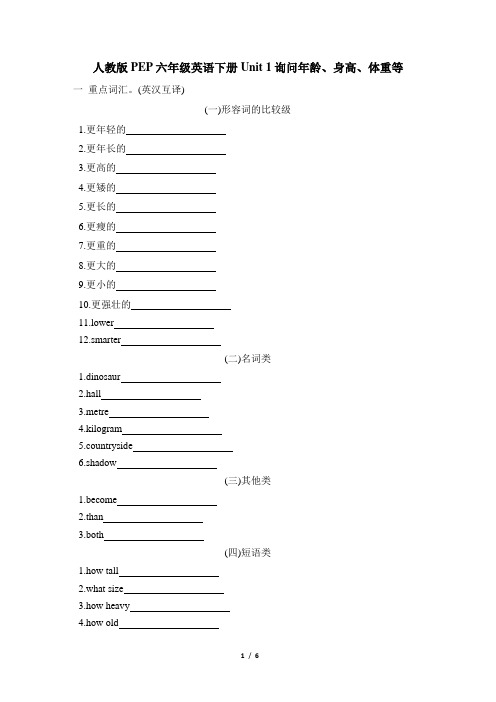
人教版PEP六年级英语下册Unit 1询问年龄、身高、体重等一重点词汇。
(英汉互译)(一)形容词的比较级1.更年轻的2.更年长的3.更高的4.更矮的5.更长的6.更瘦的7.更重的8.更大的9.更小的10.更强壮的11.lower12.smarter(二)名词类1.dinosaur2.hall3.metre4.kilogram5.countryside6.shadow(三)其他类1.become2.than3.both(四)短语类1.how tall2.what size3.how heavy4.how old5.have a look6.go on a trip7.go down8.lower and lower9.longer and longer二重点句子。
(汉译英)(一)询问及回答身高——你有多高?——我身高1.65米。
__________________________________________________________________ __________________________________________________________________ (二)询问及回答体重——你体重多少?——我体重49公斤。
__________________________________________________________________ __________________________________________________________________ (三)询问及回答鞋子尺码——迈克,你穿多大码的鞋?——我穿37码的鞋。
__________________________________________________________________ __________________________________________________________________(四)作比较的句子1.你的脚比我的大。
人教版pep英语六年级下册单词
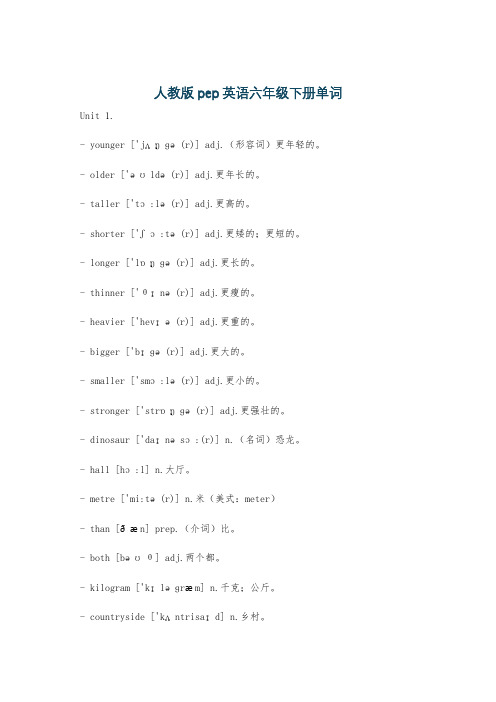
人教版pep英语六年级下册单词Unit 1.- younger ['jʌŋɡə(r)] adj.(形容词)更年轻的。
- older ['əʊldə(r)] adj.更年长的。
- taller ['tɔ:lə(r)] adj.更高的。
- shorter ['ʃɔ:tə(r)] adj.更矮的;更短的。
- longer ['lɒŋɡə(r)] adj.更长的。
- thinner ['θɪnə(r)] adj.更瘦的。
- heavier ['hevɪə(r)] adj.更重的。
- bigger ['bɪɡə(r)] adj.更大的。
- smaller ['smɔ:lə(r)] adj.更小的。
- stronger ['strɒŋɡə(r)] adj.更强壮的。
- dinosaur ['daɪnəsɔ:(r)] n.(名词)恐龙。
- hall [hɔ:l] n.大厅。
- metre ['mi:tə(r)] n.米(美式:meter)- than [ðæn] prep.(介词)比。
- both [bəʊθ] adj.两个都。
- kilogram ['kɪləɡræm] n.千克;公斤。
- countryside ['kʌntrisaɪd] n.乡村。
- shadow ['ʃædəʊ] n.影子;阴影。
- smarter ['smɑ:tə(r)] adj.更聪明的。
Unit 2.- cleaned [kli:nd] v.(动词)打扫(clean的过去式)- stayed [steɪd] v.停留;待(stay的过去式)- washed [wɒʃt] v.洗(wash的过去式)- watched [wɒtʃt] v.看(watch的过去式)- had [hæd] v.患病;得病(have的过去式)- had a cold [hæd ə kəʊld] 感冒。
六年级英语人教版下册知识汇总
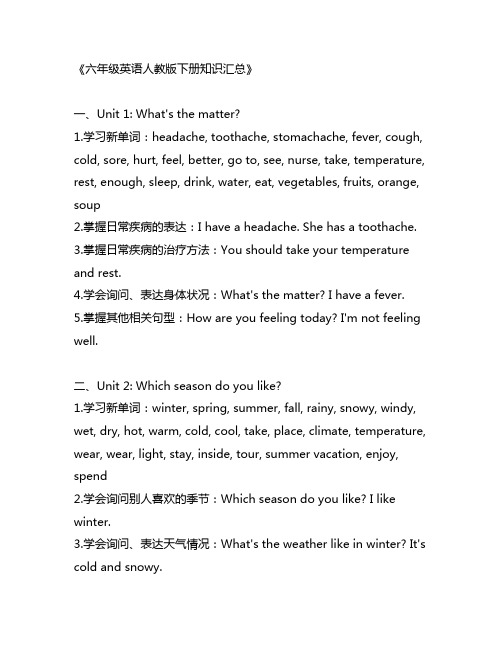
《六年级英语人教版下册知识汇总》一、Unit 1: What's the matter?1.学习新单词:headache, toothache, stomachache, fever, cough, cold, sore, hurt, feel, better, go to, see, nurse, take, temperature, rest, enough, sleep, drink, water, eat, vegetables, fruits, orange, soup2.掌握日常疾病的表达:I have a headache. She has a toothache.3.掌握日常疾病的治疗方法:You should take your temperature and rest.4.学会询问、表达身体状况:What's the matter? I have a fever.5.掌握其他相关句型:How are you feeling today? I'm not feeling well.二、Unit 2: Which season do you like?1.学习新单词:winter, spring, summer, fall, rainy, snowy, windy, wet, dry, hot, warm, cold, cool, take, place, climate, temperature, wear, wear, light, stay, inside, tour, summer vacation, enjoy, spend2.学会询问别人喜欢的季节:Which season do you like? I like winter.3.学会询问、表达天气情况:What's the weather like in winter? It's cold and snowy.4.学会描述喜欢的季节特征:I like summer because it's warm and sunny.5.学会描述自己在某个季节所做的活动:I stay inside and read in winter.三、Unit 3: What are you doing for vacation?1.学习新单词:museum, camping, hiking, zoo, beach, climb, mountain, forest, river, lake, trip, tour, visit, site, decide, activity, prepare, ready, camping, pack, tent,pass, sleeping bag, flashlight, mirror, toothbrush, toothpaste, camera2.学会询问别人在假期做什么:What are you doing for vacation? I'm camping.3.学会描述自己假期的计划:I'm climbing mountains and visiting the zoo.4.学会建议朋友假期活动:You should go hiking and visit the museum.5.掌握相关活动的动词表达:We're visiting a zoo and camping near a river.四、Unit 4: How do you get to school?1.学习新单词:bike, helicopter, skate, walk, bus, subway, train, car, taxi, boat, ship, ferry, ride, fast, foot, wear, seat, belt, important, drive, carefully, happily2.学会询问别人通常怎么上学:How do you get to school? I go to school by bike.3.学会描述自己怎么上学:I walk to school every day.4.学会询问别人怎么去某个地方:How do you get to the zoo? I go by subway.5.掌握相关交通工具的动词表达:I ride a ferry to get to the island五、Unit 5: How much is it?1.学习新单词:shopping, mall, bookstore, drugstore, toy store, shoe store, music store, price, store, sell, money, pay, spend, buy, cheap, expensive, sale, discount, Dollar, Cent, Euro, Pound, Yen, Yuan2.学会询问价格:How much is the T-shirt? It's $ 10.3.学会描述购物体验:I went to the bookstore and bought a book.4.学会询问和表达购物时的价格:The shoes are expensive. I spend $50 on theputer.5.掌握货币表达方式:How much is the dress? It's 100 yuan.六、Unit 6: I'm watching TV.1.学习新单词:play, TV,puter, video, game, chat, with, friend, alone, sometimes, air, outside, talk, on the phone, make, model, ship, airplane, kite, bird, rocket, fly, away2.学会询问别人在做什么:What are you doing? I'm playingputergames.3.学会描述自己正在做的事情:I'm watching TV and chatting with my friend.4.学会表达自己的喜好:I like playing video games and talking on the phone.5.学会表达某些特殊活动:I'm flying a kite in the park.七、Unit 7: What does she look like?1.学习新单词:young, old, have, long, short, curly, straight, blonde, hair, eyes, wear, glasses, big, small, pretty, handsome, tall, short, slim, heavy, dress, skirt, T-shirt, blouse, shirt2.学会询问看起来是什么样子:What does she look like? She is tall and slim.3.学会描述别人的外貌特征:She has long, curly hair and big eyes.4.学会询问和描述服装穿着:What is she wearing? She is wearinga skirt and a T-shirt.5.学会表达自己的外貌特征:I have short, straight hair and small eyes.八、Unit 8: How was your school trip?1.学习新单词:school trip, climb, mountain, wonder, student, teacher, guide, learn, lot, see, different, plant, animal, ground, sun, shine, sky, blue, tree, leaf, same, big, small, much, little2.学会询问和描述学校旅行的情况:How was your school trip? It was wonderful. We climbed a mountain and saw many different plants and animals.3.学会询问和表达在旅行中所见所闻:What did you see on the school trip? We saw a lot of birds and flowers.4.学会表达个人感受:It was a great experience. I learnt a lot during the school trip.5.掌握描述旅行中自然环境的单词和短语:There were many big trees and much sunshine during the school trip.九、Unit 9: When is Easter?1.学习新单词:month, year, holiday, Easter, Christmas, New Year's Day, Spring Festival, Halloween, Thanksgiving Day, Valentine's Day, Mother's Day, Father's Day, holiday, celebrate, on, in, when2.学会询问和表达节日时间:When is Christmas? It's on December 25th.3.学会介绍和讨论节日习俗:We celebrate Thanksgiving Day on the fourth Thursday of November.4.学会描述不同节日习俗:We give presents on Valentine's Day.5.学会对不同节日的预祝:Happy New Year! Happy Mother's Day!结语:以上是六年级英语人教版下册知识的汇总总结,通过对每个单元内容的梳理和归纳,可以更好地帮助学生系统地学习和掌握相关知识,在英语学习过程中取得更好的学习效果。
人教版小学PEP英语五六年级下册知识点归纳

⼈教版⼩学PEP英语五六年级下册知识点归纳Unit 1 My day⼀、重点词汇。
五、重点句型。
1、询问别⼈什么时候做某事的句型及回答。
句型结构:问:When do you+动词短语原形+其他?(你/你们什么时候做某事?)答:I/We(+频度副词)+动词短语原形+at+具体时间(我/我们通常在⼏点做某事。
)例:问:When do you go to bed?(你什么时候上床睡觉?)答:I go to bed at 9:00p.m (我晚上9点上床睡觉。
)注意:当主语是第三⼈称单数(he,she,it,单个⼈名或单数名词)时,助动词do要变成does,句型结构是:When does+主语(第三⼈称单数)+动词短语原形+其他?2、询问别⼈周末做什么的句型及回答。
句型结构:问:What do you do on theweekend?(你周末做什么?)答:I(+频度副词)+动词(短语)+其他。
例:问:What do you do on theweekend?(你周末做什么?)答:I usually read books. (我通常看书。
)注意:当主语是第三⼈称单数(he,she,it,单个⼈名或单数名词)时,助动词do要变成does,句型结构是:What does+主语(第三⼈称单数)+do+on the weekend?六、四会句⼦:When do you finish class in the morning ? 你们上午的课到⼏点结束?We finish class at 1 o’clock . 我们⼀点钟结束上午的课。
What do you do on the weekend ? 你周末做什么?I often watch TV and play ping-pong with my father . 我经常看电视,也常和我爸爸⼀起打乒乓球。
七、语⾳:cl /kl/ clean clock class cleverpl /pl / plate eggplant please playUnit 2 My favourite season三、重点句型1、询问别⼈天⽓怎么样的句型及回答。
人教版PEP六年级英语下册单词表(带音标)

人教版PEP六年级英语下册单词表(带音标)人教版PEP六年级英语下册单词表(带音标)Unit 1tall[t`:l]—taller[t`:lə]更高的shrt[ʃ`:t]—shrter [ʃ`:tə]更矮的strng [str`ŋ]—strnger [str`ŋə]更强壮的ld[əuld]—lder [əuldə]年龄更大的ung[>ŋ]—unger [ˈ>ŋɡə]更年轻的(entieter [ˈsentii:tər]) 厘米than [ðən]与…相比较little [ˈlitl]小的tail [teil]尾巴thin [θiŋ]想;思考funn[ˈf>ni] —funnier [ˈf>niə]更滑稽的g(ilgra [ˈɪləɡræ]) 千克;公斤big [biɡ]—bigger [biɡə]更大的heav [ˈhevi]—heavier [ˈheviə]更重的lng [l`ŋ]—lnger [l`ŋə]更长的thin [θin]—thinner [ˈθɪnə]更瘦的sall [s`:l]—saller [s`:lə]体型更小feet [‘fi:t, fi:t]脚(复数)size [saiz]号码;尺码ear[εə] 穿eter[i:tə] 米tn[t>n, tuŋ] 吨eah[i:tʃ] 各自;每个squid[sid] 鱿鱼lbster[‘l`bstə] 龙虾shar[ʃɑ:] 鲨鱼deep[di:p] 深的seal[si:l] 海豹sper[spə:] hale[heil] 抹香鲸i ller[‘ilə] hale[heil] 虎鲸even [‘i:vən]甚至Unit 2have a fever[‘fi:və] [hæv ei ˈfi:və]发烧hurt [hə:t] 疼痛have a ld [hæv ə əuld]感冒have a tthahe [hæv ei ˈtu:θˌeɪ]牙疼have a headahe [hæv ə ˈhedei]头疼have a sre [s`:] thrat [θrəut]喉咙疼atter[‘ætə]事情,麻烦sre [s`:]疼的feel [fi:l]感觉si[si] 不舒服的;有病的hurt[hə:t]疼痛nse[nəuz] 鼻子peple[‘pi:pl] 人们flu[flu:] 流感n[nəu] 知道ight [ait]可以;能rr[‘>ri, ‘ə:ri] 烦恼;担忧ediine[‘edisin] 药drin [driŋ]饮料sta[stei] 在;逗留better [ˈbetə]更好的sn [su:n]立刻;不久tired[‘taiəd]疲劳的,累的exited[i’saitid]兴奋的angr[‘æŋɡri]生气的;愤怒的happ[‘hæpi]高兴的bred[b`:d]无聊的,烦人的sad[sæd] 忧伤的,悲伤的trip[trip] 旅行fail [feil]不及格;失败test [test]测试hear[hiə] 听见;听到ath[ætʃ] 比赛beteen[bi’ti:n] 在…之间pass[pɑ:s, pæs] 传递i[i] 踢a little [ə ˈlitl]有些gal[ɡəul] 得分bune[bauns] 反弹ff [`f]距;离;离开anther[ə’n>ðə] 另一个gues s[ɡes] 猜测in[in]过去式n [>n, ə<n]赢gae [ɡei]比赛laugh [lɑ:f, læf] at 因…而发笑Unit 3ath [`tʃ]—athed [`tʃt]看ash[`ʃ]—ashed [`ʃt]洗lean [li:n]—leaned[li:nd]打扫pla[pleɪ]—plaed[pleid]玩visit [ˈvizit]—visited [ˈvizitid]看望d [du:, du, də, d]—did [did]last [lɑ:st]上一个eeend[ˌi:ˈend]周末[u]—ed [ut]做(饭)g [ɡəu]—ent[ent]去t[tu:,tu,tə]向;朝par[pɑ:]公园g siing [ɡəu ˈsɪɪŋ]—ent[ent] siing去游泳read[ri:d]—read [red] 读g fishing—ent fishing[ˈfɪʃɪŋ]去钓鱼g hiing—ent hiing [haiɪŋ]去郊游esterda[‘estədi,-dei] 昨天stud[‘st>di]过去式studied[ˈst>di:d]学习tngue tister [t>ŋ ˈtɪstə]绕口令fl[flai]过去式fle [flu:]飞return[[ri’tə:n]] 送回;归还si[si]过去式sa[sæ]游泳Unit 4learn[lə:n]—learned [ˈlə:nid] 学习hinese [tʃaɪˈni:z, -ˈni:s]中;汉语sing[siŋ] —sang[sæŋ] 唱歌and [ænd, ənd, ən]和dane[dɑ:ns, dæns] —daned[dɑ:nst]跳舞eat[i:t]—ate[et,eit] 吃gd [ɡud]好的tae [tei]—t[tu] 照;拍lib [lai]—libed [laid]爬have [hæv, həv, əv, v]—had [hæd]usin [ˈ>zn]堂表兄弟;堂表姐妹I’ll=I ill [il]bu[bai]—bught[b`:t] 买present [ˈprezənt]礼物r[rəu]—red[rəud]划船abat [bəut]小船see[si:]—sa[s`:] 看elephant [ˈelifənt]大象g siing[ˈsi:ɪŋ]—ent siing 去滑雪g ie-sating [ais ˈseɪtɪŋ]—ent ie-sating 去滑冰h [hau]怎么,如何get [ɡet]—gt [g`t]到达last [lɑ:st] [læst]上一个的,仅余的,留在最后的relax[ri’læs] 放松prepare[pri’pεə] 准备。
- 1、下载文档前请自行甄别文档内容的完整性,平台不提供额外的编辑、内容补充、找答案等附加服务。
- 2、"仅部分预览"的文档,不可在线预览部分如存在完整性等问题,可反馈申请退款(可完整预览的文档不适用该条件!)。
- 3、如文档侵犯您的权益,请联系客服反馈,我们会尽快为您处理(人工客服工作时间:9:00-18:30)。
--没有,我感冒了。整个周末都待在家里睡觉。
I want to buy the new film magazine.
我想买期新的电影杂志。
Unit 3
(ride)rode a horse
骑马
(hurt)hurt my foot
伤到脚
(ride)rode a bike
你去哪儿了?
我(和我家人)去三亚。
--Did you fo to Turpan?
--Yes, we did.
你(们)去吐鲁番了吗?
是的,去了。
--How did you go there?
--We went there y plane.
你们怎么去的?
我们坐飞机去的。
It looks like a mule.
--Yes, I cleaned my room and washed my clothes.
--你还做了其他事吗?
--是的,我打扫房间,还洗了衣服。
--What did you do last weekend? Did you see a film?
--No, I had a cold.Istayed at home all weekend and slept.
它比我两加起来还高。
Unit 2
(clean)cleaned my room
打扫房间
(read)read a book
看书
(wash)washed my clothes
洗衣服
(see)saw a film
看电影
(stay)stayedat old
感冒
(watch)watchedTV
--I am 1.65 metres.
--你有多高?
--我身高1.65米。
--How heavy are you?
--I’m 48 kilograms.
--I am 48 kilograms.
--你有多重?
--我体重48公斤。
--What size are your shoes?
--Size 7.
--你穿多大号的鞋?
它看起来像骡子。
Sounds great!
听起来不错!
Unit 4
dining hall
饭厅
cycling
骑自行车运动
grass
草坪
go cycling
去骑自行车
gym
体育馆
ice-skate
滑冰
ago
以前
play badminton
打羽毛球
…years ago
…年以前
last year
去年
...months ago
PEP人教版六年级下册英语重点单词及句子
Unit 1
younger
更年轻的
older
更年长的
taller
更高的
shorter
更矮的
bigger
更大的
smaller
更小的
thinner
更瘦的
heavier
更重的
longer
更长的
stronger
更强壮的
--How tall are you?
--I’m 1.65 metres.
--七号。
Your feet are bigger than mine.
My shoes are size 37.
你的脚比我的大。
我穿37号的鞋。
That’s the tallest dinosaur in this hall.
那是厅里最高的恐龙。
It’s taller than both of us together.
--I fell off my bike and hurt my foot.
--怎么了?
--我从自行车上摔下来然后伤到脚了。
--Are you all right?
--I’m OK now.
你还好吧?
我现在没事了。
--Where did you go?
--(My family and) I went to Sanya.
我那时候没有电脑也没有网络。
Before, I was quiet.Now, I’m (I am) very active in class.
以前我很安静。现在我在课堂上很活跃。
I was short, so I couldn’t ride my bike well.Now, I go cycling everyday.
左
post office
邮局
right
右
bookstore
书店
straight
笔直地
cinema
电影院
go straight
直走
hospital
医院
turn left
转左
crossing
十字路口
turn right
我以前个子小,自行车骑得不好。现在我天天骑车。
--How do you know that?
--Easy, I looked it up on the Internet.
--你怎么知道的?
--很容易,我上网查阅的。
六年级上册重点单词及句子
Unit 1
science
科学
turn
转弯
museum
博物馆
left
--很好,谢谢。
--What did you do?
--I stayed at home with your grandma. We drank tea in the afternoon and watched TV.
--你干什么了?
--我和你奶奶待在家里。我们喝了下午茶,还看了电视。
--Did you do anything else?
…月以前
last month
上个月
Tell us about your school, please.
请给我们讲讲您的学校吧。
There was no library in my old school.
我以前的学校里没有图书馆。
There were no computers or Internet in my time.
看电视
(sleep)slept
睡觉
last weekend
上周末
yesterday
昨天
last night
昨晚
the day before yesterday
last Monday
上周一
前天
--How was your weekend?
--It was good, thank you.
--你周末过得怎么样?
骑自行车
(eat)ate fresh food
吃新鲜食物
(go)went camping
去野营
(take)took pictures
拍照
(go)went fishing
去钓鱼
(buy)bought gifts
买礼物
(go)went swimming
去游泳
far from
远离
--What happened?
